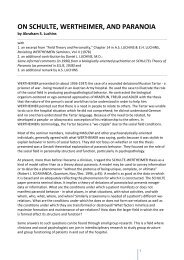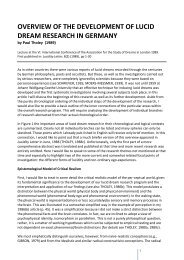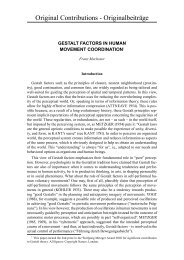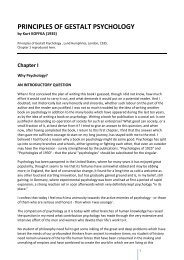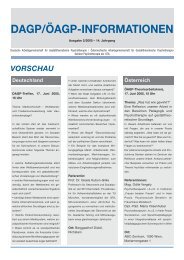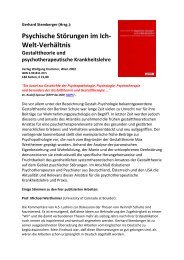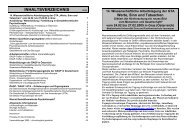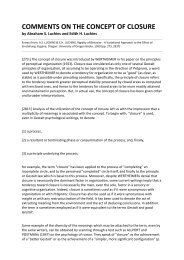Mary HENLE - Society for Gestalt Theory and its Applications (GTA)
Mary HENLE - Society for Gestalt Theory and its Applications (GTA)
Mary HENLE - Society for Gestalt Theory and its Applications (GTA)
- No tags were found...
You also want an ePaper? Increase the reach of your titles
YUMPU automatically turns print PDFs into web optimized ePapers that Google loves.
This theme appears again <strong>and</strong> again in Perls' books.It might be supposed that he is talking here about technique, about avoiding interpretations intherapy. He is, of course, also talking about technique, but some of these quotations go muchfarther. There are other indications of Perls' rejection of scientific psychology. He regards hisapproach as existential <strong>and</strong> asserts: 'Existentialism wants to do away with concepts, <strong>and</strong> to workon the awareness principle, on phenomenology' (1969/1971:16). Again, his approach is describedas 'an ontic orientation where Dasein - the fact <strong>and</strong> means of our existence - manifests <strong>its</strong>elf,underst<strong>and</strong>able without explanatoriness; a way to see the world not through the bias of anyconcept' (1969/1972:61).Science, of course, is conceptual.In other connections, too, we see that Perls is operating outside the sphere of natural science. Thestructure of our lifescript, he says, is often called karma or fate (1973:120), by no means ascientific concept. Nor is satori (1970/1973.-13), nor 'mini-satori' (1973:131). Hints of vitalismappear in his writing. For example, Perls identifies his 'excitement' with Henri Bergson's élan vital(1970/1973:38). Again, he describes a tree whose roots grow in the direction of fertilizer <strong>and</strong> shiftif the fertilizer is shifted; he comments: 'We cannot possibly explain / By calling this 'mechanics''(1969/ 1972:28). In this connection, it is interesting to recall a remark by Koffka, 'I believe that themechanist has no better friend than the vitalist' (1938:226). Perls, unable to accountmechanistically <strong>for</strong> the phenomena of growth <strong>and</strong> regulation, resorts to vitalism. But science, asthe <strong>Gestalt</strong> psychologists in particular have pointed out, need not be mechanistic; thus the failureof mechanism does not exclude a scientific approach.In short, we find that <strong>Gestalt</strong> psychology is a natural science, while Perls - whether he knows it ornot - st<strong>and</strong>s in the Tradition of Geisteswissenschaft. It would be interesting to know what sciencehe has in mind when he modestly acknowledges, 'The crazy Fritz Perls is becoming one of theheroes in the history of science, as someone called me at the convention, <strong>and</strong> it is happening inmy lifetime' (1969/1972:265). <strong>Gestalt</strong> psychology is an explanatory science, while Perls choosesunderst<strong>and</strong>ing psychology. The difference is so crucial that I could conclude at this point that thereis no substantive relation between <strong>Gestalt</strong> Psychology ind gestalt therapy. Other important issuesremain, however.A related point is the anti-intellectualism that pervades gestalt therapy. 'Intellect,' says Perls, 'isthe whore of intelligence - the computer, the fitting game' (1969/1971:24). 'It might sound a bitpeculiar,' he concedes, 'that I disesteem thinking, making it just a part of role-playing'(1969/1971:37). 'The intellect . . . [is] a drag on your life' 1969/1971:76). 'Each time you use thequestion why, you diminish in stature. You bother yourself with false, unnecessary in<strong>for</strong>mation'(ibid). I could multiply quotations. <strong>Gestalt</strong> psychologists, on the contrary, have the highest respect<strong>for</strong> disciplined thinking, one of whose finest achievements is science.Let us now consider the mind-body problem. <strong>Gestalt</strong> psychology has <strong>for</strong>mulated the hypothesis ofpsychophysical isomorphism, both as a position on the mind-body question <strong>and</strong> as a heuristic.Isomorhism starts from the prima facie dualism of mind <strong>and</strong> matter but hypothesizes that molarevents in experience are structurally identical to the corresponding molar physiological events inthe brain. This is a kind of parallelism, but more specific than mere parallelism; it is this specificitythat has made isomorphism a powerful heuristic. Parallelism of any kind is, of course, a dualistichypothesis.3



